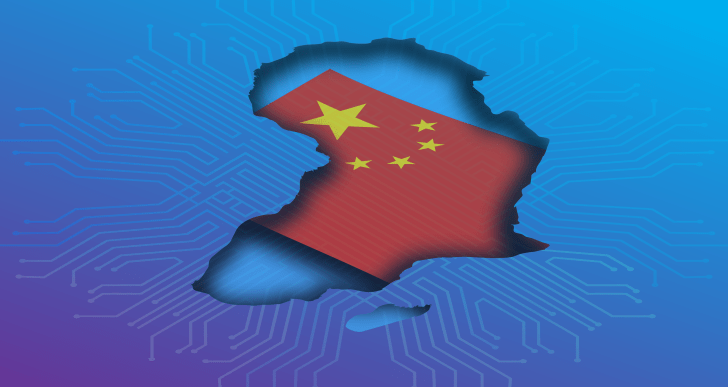There’s been a heap of China in Africa coverage over the last decade, but very little of it is focused on tech. In part, because the country’s engagement with African startups is light compared to its deal-making on infrastructure and commodities. Now, that all looks to be shifting.
TechCrunch has tracked moves by a number of Chinese actors in Africa’s tech sector over the past year. This could signal the next chapter in China’s influence in Africa — one more digital than bricks and mortar.
Primer on China in Africa
To the former, the government of China has designated Africa a strategic priority in its foreign relations and has pursued policies and programs accordingly.
China has increased political, cultural, and commercial ties with Africa on a rapid scale. It has expanded trade in goods and services, and embarked on a spree of business and infrastructure financing activity.
Chinese government-financed projects built Kenya’s Thika Superhighway, as well as the African Union’s $200 million Addis Ababa headquarters. Many of China’s projects on the continent are connected to deals on goods and commodities trade.
 As a country, China is now Sub-Saharan Africa’s single largest trading partner, and at least one estimate pegs over a million Chinese living in Africa.
As a country, China is now Sub-Saharan Africa’s single largest trading partner, and at least one estimate pegs over a million Chinese living in Africa.
Although China surpassed the U.S. on trade with Africa in 2009, the U.S. still invests more than China when it comes to foreign direct investment (or FDI), according to UNCTAD. While I avoid the “who’s winning Africa” tropes — which are off for a continent carved up and colonized years ago — the U.S. has a much stronger influence in Africa’s tech sector than China.
Overall, the U.S. has played a significant role in phase one of digital Africa. A number of ventures that gained traction in the earlier days of the continent’s tech boom (see Paga and MallforAfrica) were launched by repatriate founders — Africans who had worked and studied abroad (often in the U.S. and Silicon Valley) then returned to the continent to start tech companies.
First-generation and immigrant Africans have taken prominent positions in American tech firms and led efforts of those companies to expand in Africa (see Ime Archibong at Facebook and Chris Lwanga at Microsoft).
And a greater number of U.S. funds are financing rounds that led African startups to cross the $1 billion in VC raised in a year mark in 2018.
China and African tech
Circling back to China, I’ve not yet pinned down a big state-driven directive for the country to engage specifically with Africa tech. TechCrunch has, however, tracked a notable uptick in deal flow, partnerships, and investment in the continent by Chinese actors this year.
July saw Chinese-owned Opera raise $50 million in venture spending to support its growing West African digital commercial network — which includes browser, payments and ride-hail services. Several participants in the raise highlighted some Chinese funds that could take a greater orientation toward Africa. Joining Sequoia China and IDG Capital in the round were Beijing based VC firms Source Code Capital and GSR Ventures.
On the hardware front, Africa focused Chinese mobile-phone and device maker Transsion raised 2.8 billion yuan (or ~$394 million) billion in IPO on Shanghai’s STAR Market in September 2019.
 Headquartered in Shenzhen — where African e-commerce unicorn Jumia also has a logistics supply-chain facility — Transsion is a top-seller of smartphones in Africa under its Tecno brand. The company also has a manufacturing facility in Ethiopia.
Headquartered in Shenzhen — where African e-commerce unicorn Jumia also has a logistics supply-chain facility — Transsion is a top-seller of smartphones in Africa under its Tecno brand. The company also has a manufacturing facility in Ethiopia.
Transsion’s IPO could bring more partnerships and venture funding from the company to Africa. A preview may be the partnership between Nairobi based Future Hub — a Transsion backed incubator — and Kenyan fund Wapi Capital to select and invest in early-stage African startups.
A particular bellwether for Chinese activity in Africa’s tech sector is the moves of Jack Ma and Alibaba on the continent. The e-commerce company teamed up with San Francisco and Lagos based fintech startup Flutterwave in July to offer digital payments between Africa and China on Alibaba’s Alipay service.
The partnership came about as a result of Flutterwave founder Olugbenga Agboola’s acceptance in Alibaba’s Africa eFounders Fellowship. “Because of that I was in China to do meetings with Jack Ma and the only ask I had from that trip is ‘I want to be the Africa payment infrastructure that plugs directly into Alipay,’ ” Agboola told TechCrunch.
Alibaba founder Jack Ma has made several trips to the continent and this March announced the $1 million Africa Netpreneur Prize for African startups and founders.
As an e-commerce platform, Alibaba is not fully live in Africa. The company has a growing list of soft-touch type activities on the continent and there’s plenty of conjecture on Alibaba’s long-term play. A company spokesperson told TechCrunch, “Alibaba’s main focus in Africa is to help empower local SMEs and entrepreneurs to capture opportunities from the new digital economy” — which rings PR speak.
One Africa VC investor who’s been close to Alibaba’s Africa activities offered this take, speaking on background. “In the short-term, they may be interested in supporting some startup markets and acquiring some startups,” the investor said.
“What I think they are really doing is building their network and setting up the foundation to learn more about the dynamics on the continent to start running their own operations on the ground.”
Founder to founder
It’s a good bet to expect more deals, investment, and partnerships by Chinese actors in Africa’s innovation scene over the coming years.
So what does this mean for African and global tech?
The upside for Africa’s startups is the potential for more venture funding and partnership choices beyond local actors and those in U.S. and Europe. China’s tech engagement in Africa could also signal the next phase of China’s influence in Africa and engagement around the globe.
For now, the country’s relations with the continent have been largely state-led and trade centric. China’s interaction with African tech is shaping up to be more founder to founder, CEO to CEO, and VC-driven — a model that could be a preview of the country’s future orientation with the world.
